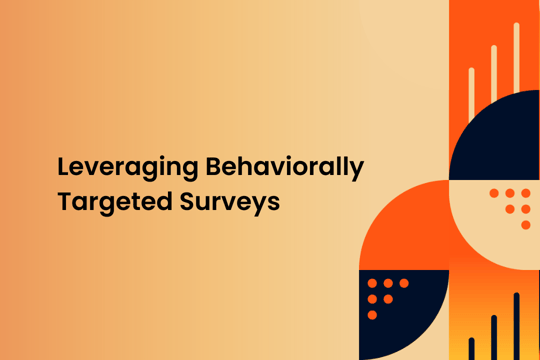Behaviorally targeted surveys: the marketer's secret weapon

The greatest need for every marketer is to deeply understand the customer experience. Without that, all other decisions, from product development to marketing strategy, are just guesswork and not centered on the engine that drives brand success – the customer. Traditional market research has sought to understand the customer by asking them about their actions and beliefs, and while that’s better than developing strategies without the customer in mind, altogether, it is an incomplete approach.
Marketers now have an opportunity to gain a competitive edge by leveraging an underrated yet highly effective technique in their toolbox: behavioral targeting. This novel capability empowers researchers to transcend the confines of traditional survey targeting attributes like demographics and geographics to query people who have relevant observed behavioral traits.
So what does this mean for insights professionals looking to put consumer experience at the center of their strategy? The largest benefit for researchers is the ability to optimize the screening process by qualifying respondents based on real, validated behaviors.
Meet the new and improved screener
Rather than leveraging traditional screeners that rely solely on human recall and honesty, qualifying respondents based on measured behaviors is a more efficient way to refine the right participants for a study. With behaviorally targeted studies, researchers can mitigate other variables that could negatively impact screening accuracy, such as recall bias and ineffective screening question design.
Actual behaviors offer the truest picture of consumer intent and can serve as an indication of a consumer’s stage in their buying process. For example, one can easily differentiate between consumers who are actively in the market for a new car and those who merely say that they are by studying their online behaviors. Looking for certain high-intent activities, like browsing used cars online, can help confirm if a consumer actually lies within a brand’s target market. This enhanced understanding can unlock research on valuable audiences with verified behaviors tailored to specific needs, whether that’s frequent travelers, loyal investors, or avid game enthusiasts.
More accurate and efficient screening subsequently results in more productive research studies. On one hand, less time is needed to filter out unqualified responses and research projects can be carried out faster. On the other hand, researchers can maximize the value generated from a study, because the insights are coming from an audience that’s already been validated by observed behaviors. This level of targeting precision unlocks powerful insights, which in turn helps drive even more business decisions.
Improve consumer experience
Most important of all, behaviorally targeted surveys make for a better consumer experience. Respondents can qualify for a survey without having to answer a lengthy series of screening questions. Because the number of screeners is reduced or even removed altogether, the total length of interview is shortened, which helps boost engagement and satisfaction for the participants. In addition, shorter surveys often deliver more accurate responses by combating response fatigue. For example, researchers who want rich responses to open-ended questions can make sure their audiences have more time to answer them instead of filling out screening questions they could have already known the answer to.
Suboptimal survey targeting is one of the most common issues plaguing the industry today. However, by choosing to target survey participants based on their real behaviors, one can ensure the validity of their audience and maximize the accuracy and actionability of their research findings.
An optimized screening process also ensures that consumers are served surveys that are most relevant to them. Providing the best experience for research participants has been and will continue to be a priority for everyone in the insights industry, especially given the limited supply of respondents today. Qualifying respondents by their observed behaviors and making the screening process faster for them is just one of the many different ways to improve their experience.
Better research studies are never the end goal, and instead are an important interim outcome contributing to larger and often critical business objectives. Accurate studies drive better product design, brand strategy, and customer experience that grow revenue. Making a small but impactful change by incorporating behavioral data into the survey process is a powerful weapon in the fight for market share.
Are you making full use of the behavioral capabilities available in research today?
This blog originally appeared on Greenbook on April 21, 2022.

Subscribe now!
Get our new reports, case studies, podcasts, articles and events
